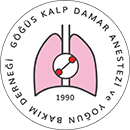

Ultrasound-Guided Rhomboid Intercostal Block for Analgesia After Cardiac Surgery: A New Indication for Novel Fascial Plane Block
Burhan Dost1, Cengiz Kaya1, Semih Murat Yücel2, Serkan Tulgar3, Alessandro De Cassai4, Deniz Karakaya11Department of Anesthesiology and Reanimation, Ondokuz Mayis University Faculty of Medicine, Samsun, Türkiye2Department of Cardiovascular Surgery, Ondokuz Mayis University Faculty of Medicine, Samsun, Türkiye
3Department of Anesthesiology and Reanimation, Samsun University Faculty of Medicine, Samsun Training and Research Hospital, Samsun, Türkiye
4UOC Anesthesia and Intensive Care Unit, University Hospital of Padua, Padua, Italy
Objectives: Acute postoperative pain is a common complication after cardiac surgery. When not properly regulated, it may have a negative impact on clinical results. One of the novel fascial plane blocks that aims to blockade the lateral cutaneous branches of the thoracic intercostal nerves is the rhomboid intercostal block. In the literature, there is no research of rhomboid intercostal block in cardiac surgery, and a limited number of reports employing this block to analgesia for thoracotomy, scapulothoracic arthrodesis, and lung transplantation. In our research, we aimed to display a case series of bilateral rhomboid intercostal blocks employed as an element of multimodal analgesia in five consecutive patients who underwent cardiac surgery through a median sternotomy.
Methods: Five adult patients who had a rhomboid intercostal block for postoperative analgesia after cardiac surgery were investigated. Within the first 24 hours after surgery, cumulative morphine consumption and pain scores during rest and coughing were assessed.
Results: In the first 24 h after surgery, the median cumulative morphine intake was 4 mg (020 mg). Also, the patients' pain scores were less (NRS≤4) at all-time points. There were no opioid-related adverse events or block-related additions in any patient.
Conclusion: As part of multimodal analgesia, the rhomboid intercostal block was thought to help reduce opioid consumption as well as pain scores in cardiac surgery cases.
Keywords: Acute, cardiac, median sternotomy, nerve block, postoperative pain, surgical procedures, ultrasonography
Makale Dili: İngilizce
(1370 kere indirildi)

















